6 Mins Read
In the US, 95% of foodservice operators expect increased or stable sales of vegan food and beverages in the next year, with 76% aiming to continue or increase the number of plant-based meat options, according to a new report by industry body the Plant Based Foods Association (PBFA). It’s in line with consumer sentiment, who have upped their plant-based intake and reduced their meat consumption.
The PBFA’s State of the Marketplace Foodservice Report states that nearly half (48.4%) of all restaurants in the US currently offer plant-based options on their menus, with a 62% increase in plant-based menu items over the past decade. The shift has stemmed from a growing acceptance of vegan food among consumers, with a greater awareness of their health, environmental and animal welfare benefits.
It follows another report by the PBFA earlier this year, which found that the US plant-based market grew by 6.6% from 2021 to 2022, reaching $8B. “The plant-based foods industry’s momentum and resilience – built on robust consumer demand – is evident across 2022 retail and e-commerce sales and foodservice performance,” Julie Emmett, VP of marketplace development at the PBFA, said at the time.
Consumer trends on plant-based eating
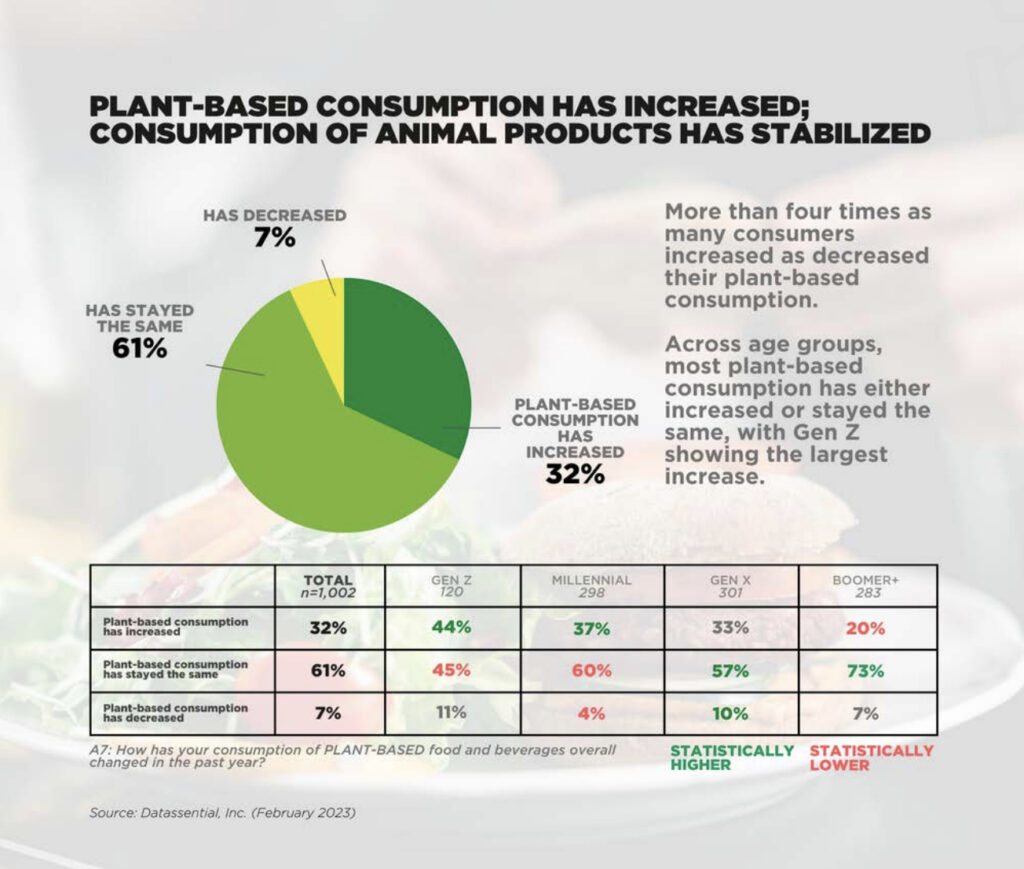
The report revealed that more than four times as many Americans increased instead of decreased their plant-based consumption, while a third say they’ll eat more vegan foods over the upcoming year. Overall, a third of consumers in the US use plant-based dairy alternatives at least once a week, followed closely by alt-meat.
When it comes to setting, around a quarter of home meals are entirely plant-based, compared to 19% of those eaten outside. And consumers are twice more likely to try plant-based foods in retail settings than foodservice ones, due to factors including convenience, cost and perceived health benefits. This follows the 27% year-on-year growth in plant-based retail sales in the US in 2021.
Meanwhile, 43% of consumers agree that the availability of plant-based food and beverages enhances the restaurant experience – a sentiment that was most prevalent among Gen Z and millennial consumers. The former demographic has a higher proportion of vegans, vegetarians and pescatarians, with 35% falling into the category of ‘meat limiters’.
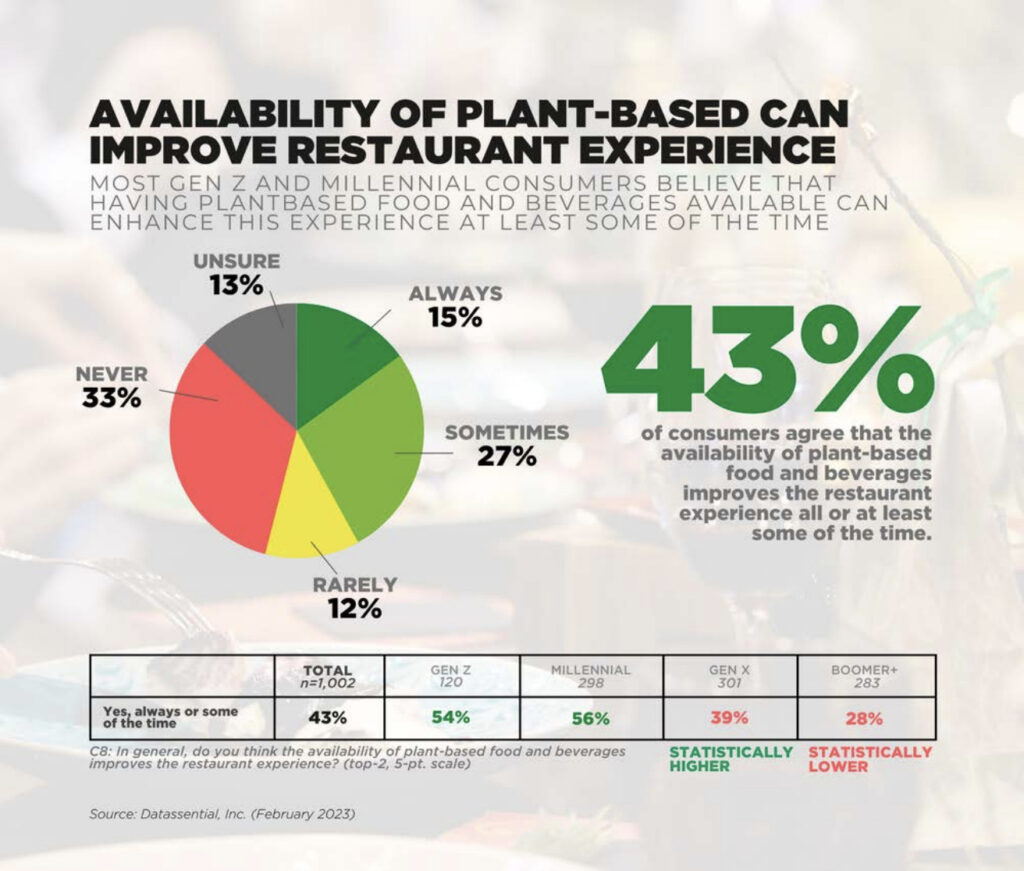
This is highlighted by recent product launches. Taco Bell introduced a vegan Crunchwrap in June, Chipotle added two plant-based options to its Lifestyle bowls as part of its ESG goals for 2023, while Charley’s Steak House collaborated with Chunk Foods to offer the latter’s plant-based whole cut on its Orlando menu.
Plant-based menu options at restaurants
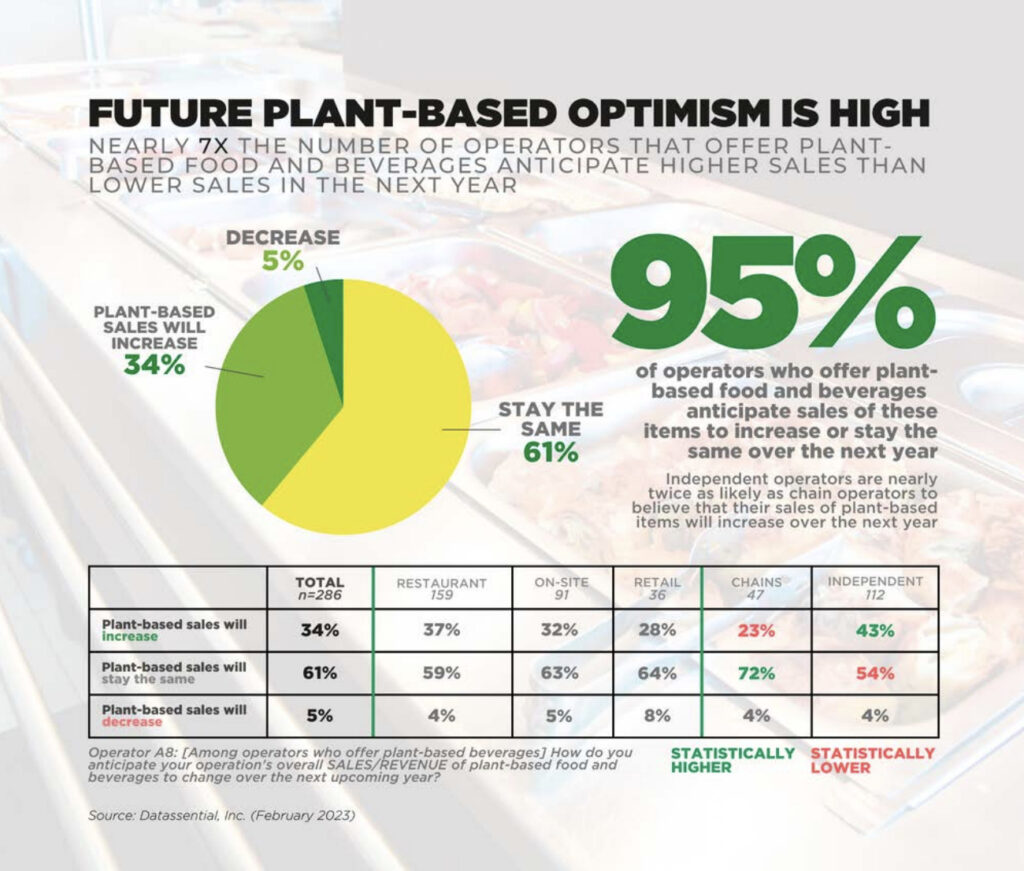
Four times as many foodservice operators plan to add plant-based meat to their menus than those who say they’ll remove it, while 8% who currently offer none plan to add vegan alternatives. The reluctance to add a plant-based meat substitute to menus is based on many considerations, including a lack of demand (53%), higher costs (46%), a higher difficulty in predicting demand and purchasing needs (33%), and vegan food not fitting the brand’s image (20%) – as well as factors like food waste and labour requirements.
But within the operators who do incorporate plant-based food into their menus, the fast-casual segment – which often caters to younger generations and those seeking healthy meals on the go – leads the way with nearly 70% menu penetration, followed by mid-scale and casual dining restaurants. Fast-casual chains Fine dining restaurants, meanwhile, are at the bottom of the list.

In terms of food types, plant-based seafood and egg options have increasingly been featured on foodservice menus, seeing a 57% and 52% year-on-year growth, respectively. In February, Israeli startup Yo Egg debuted its vegan poached eggs at six Los Angeles eateries, before launching into Veggie Grill stores nationwide. And California’s Impact Food debuted its raw sushi-grade plant-based tuna at Bay Area restaurant Onigilly.
Meanwhile, coconut milk is the leading dairy alternative used owing to its versatility, followed by almond milk. But menu presence of alt-milk is still low, given that more than half of Americans will visit or pay more at establishments that feature specific plant-based dairy alternatives.
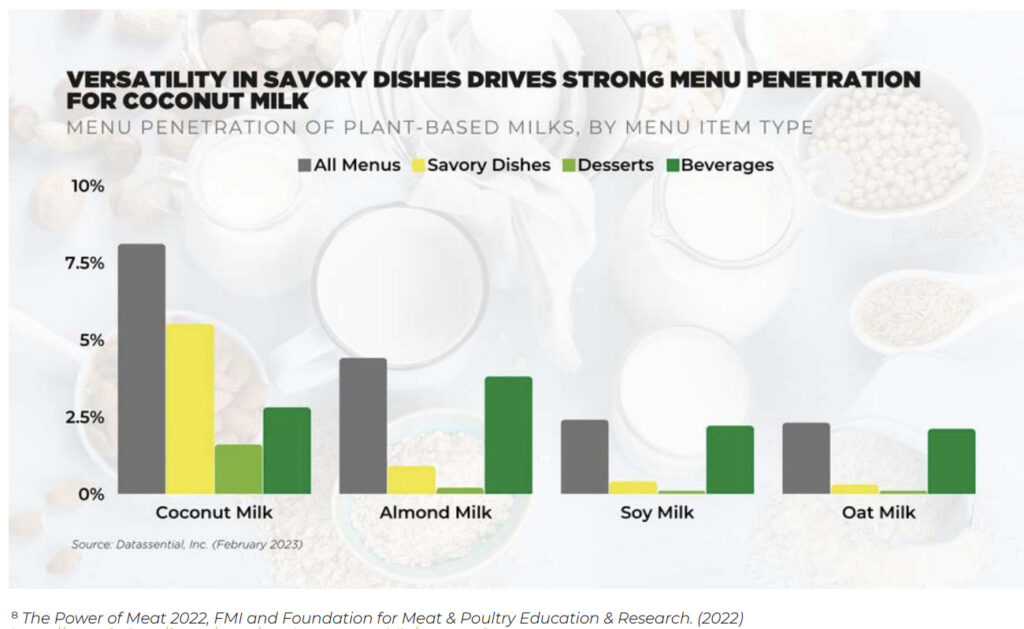
The report also found that plant-based promotions and limited-time offerings receive higher uniqueness ratings from consumers compared to animal-based counterparts. There is precedent here with McDonald’s, which trialled the McPlant for a limited time before introducing it to the permanent menu, and Shake Shack, which launched its limited-edition Vegan ShackBurger in London in 2020, and debuted its vegan burger in permanent menus in the US earlier this year. Meanwhile, Impact Food struck a deal with Pokeworks for a limited-edition poke bowl in June.
The importance of inclusivity
“The focus of foodservice operators has shifted from simply offering a separate ‘vegan menu’ to creating inclusive dining experiences that highlight the abundance of plant-based choices available,” says Hannah Lopez, director of marketplace development, foodservice at PBFA.
Across all age demographics, the PBFA says there’s a stronger preference for the terms ‘plant-based’ and ‘dairy-free’ compared to ‘vegan’ and ‘vegetarian’. The clear labelling and intentional placement of plant-based food menu options at restaurants is essential for consumer awareness and inclusivity. It echoes a report by food awareness organisation ProVeg International last week, which expressed a preference for ‘plant-based’ over ‘vegan’ on menus.
According to the PBFA, this trend suggests that consumers are open to limiting their animal product consumption without completely eliminating it. It says nearly three-quarters of Americans are interested in blended animal- and plant-based proteins, like pasta dishes with plant-based proteins and dairy cheese. While only about 20% of operators currently offer such dishes, 30% show interest in exploring this idea. This concept has already penetrated the retail sector globally, with brands like Momentum Foods, Mush Foods and Nanka all offering hybrid plant- and animal-based meats.
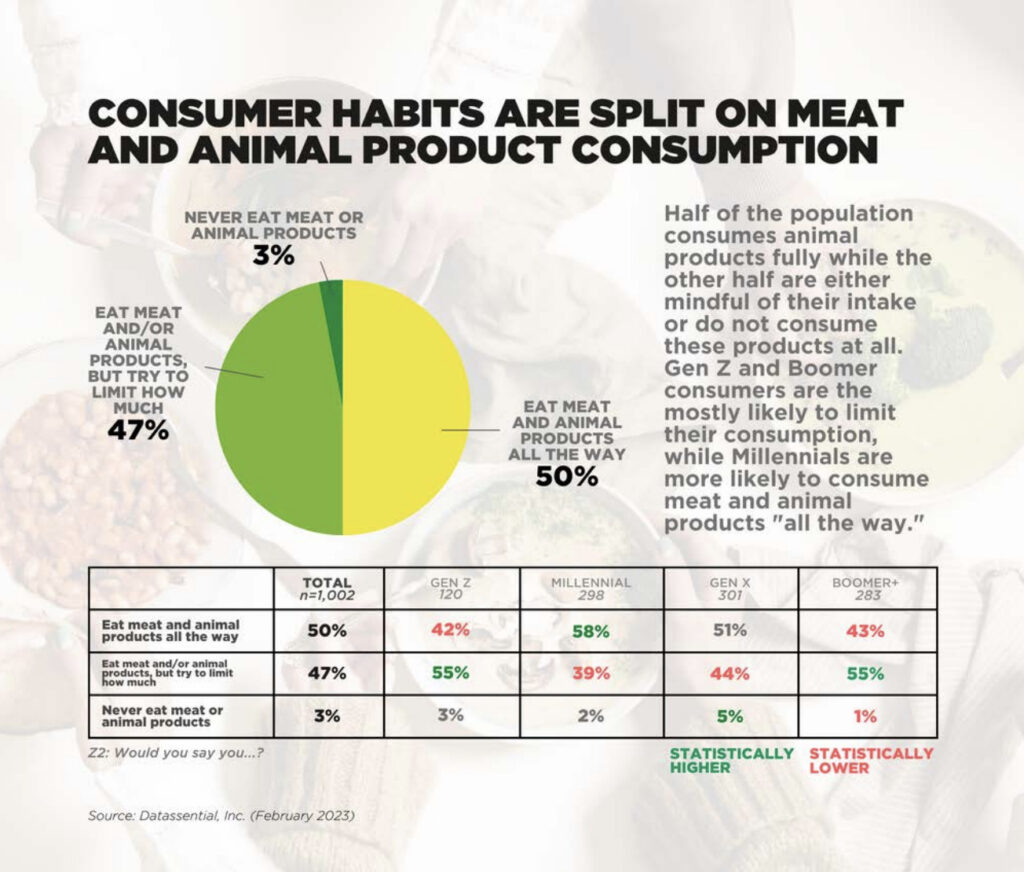
The report notes that inclusive menus are paramount: “As foodservice operators lean into menu innovation and expansion, having plant-based foods as staple menu options and ingredients will allow for more inclusive and wide-ranging customer bases, and a greater feeling among guests that their values, interests, and tastes are being served.”
In a January webinar, the PBFA presented data showing that 60% of US restaurants see plant-based as a long-term trend. This sentiment is mirrored by Jennifer DiFrancesco, director of culinary innovation at Sodexo Campus, which has committed to making its catering menu 50% plant-based by 2025. “Having plant-based foods isn’t a buzz or a trend, it’s a need and a demand that we deliver with creativity and flavour,” she says, adding: “Inclusive options are key – having the 1:1 animal to plant entrée makes it approachable, relatable, and tempting to try.”
The PBFA says it’s clear that the foodservice industry offers stability and reliability as a platform for plant-based food companies seeking long-term success in a rapidly evolving sector: “Key opportunities exist for companies and operators alike to forge meaningful, mutually beneficial partnerships to give consumers what they want: delicious, affordable, healthier, and more sustainable plant-based options.”




